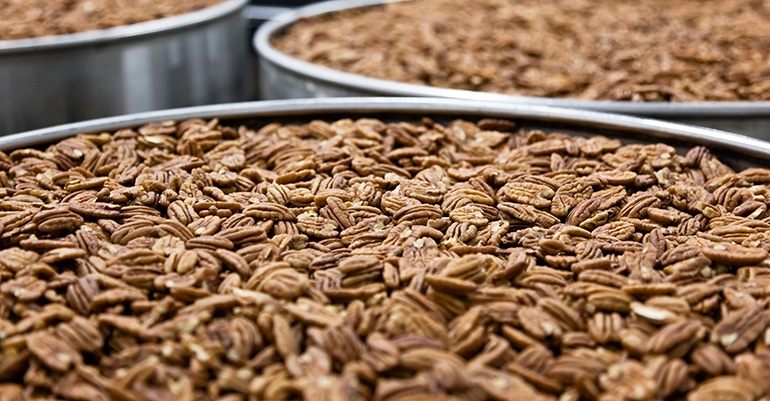
From a global perspective, pecan shipments are up — according to PecanReport.com. They laud the resiliency of the American farmer over the past two years and note, “America’s pecan farmers have seen their share of ups and downs over the last 24 months (while) managing to move their industry forward. The American Pecan Council February Industry Position Report shows demand for pecans continues its bull run with shipments up 3% at 192,372,498 pounds, primarily from in-shell shipments.”
Attendees at the recent Western Pecan Growers Association Conference in New Mexico basked in that good news, as did Harold Payne, conference speaker and president of Arizona’s Pecan Growers Association.
“We’ve seen rapid growth expansion over the last 10 years and it’s still continuing,” he told his audience. “We have a number of new acres planted that will expand production in the next five years or so, almost doubling the pecan production in the state through the orchards in Southeastern Arizona, primarily places in Cochise County where they have appropriate weather.”
Of particular interest are newer orchards along Interstate 10 in the San Simon and Bowie areas. “The first ones went in there in 2005, so they’ve come into production and will remain so for a number of seasons.”
Bottom line, for all trees expected to be in full production within five years, Arizona pecan acreage is estimated at 26,500 acres. “The American Pecan Council recently did a satellite survey to identify all pecan trees in the state, but those results are not yet available,” added Payne.
Industry profitable
Based on 30 years of experience planting and growing, primarily for farmers at the Fort McDowell Indian Reservation, the veteran farmer was optimistic in his predictions.
“The industry has been profitable for some time in Arizona and it continues to be. We are pest-free at the moment with no quarantine (unlike states East of us fighting one or more insects).”
From a problematic standpoint, things look good at the moment. Like the water situation — “People buying a farm need to know the water availability status because pecans, like many other crops, are heavy water users. The groundwater is there in Cochise County, not seriously depleted and although it’s getting more expensive as levels drop, there’s still a lot of water down there. One recent study showed water availability for another hundred years, allowing growers to get a return on their investment.”
While others in the agricultural sector have to worry about labor availability, “Our growing is rather simple, not a lot of hand labor required and our harvesting is mechanical with specialized equipment, so Arizona has been able to keep up with labor demand and supply and find what we need.”
Carry-over supply in cold storage is minimal. “Typically after shellers make their buys, the extras go into freezers, but demand continues with supply limited to what’s in the freezers and growers hoping the price will be better a few months from now.”
The last unofficial count of growers in the state was about 350 individual operations, some of them quite small in acreage and numbers of trees. “I’m guessing there are probably over 200 that could be called fairly good sized commercial farms,” he says, adding, “They all produce quality product. Because of our favorable climate, our pecans are larger than those from New Mexico and Texas and larger pecans are easier to sell.”
Asked if there was a universal message for pecan growers in the West, he cited uncertainty in the market because of tariffs and complications brought on by the COVID-19 virus, “but traditional arrangements with people you’ve previously sold to continue and the supply is still there. As long as the trades continue to produce, I think patience is the name of the game.
“In fact, if you’re not a patient person, you shouldn’t be a tree farmer because it takes quite a while for your product to mature to harvest. Our industry understands that nothing happens quickly on a tree nut farm — except disaster.”
For more news on tree nuts as reported by growers and farm advisors, subscribe to the Tree Nut Farm Press e-newsletter.
About the Author(s)
You May Also Like




